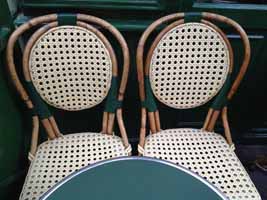The Façade
I had a kitchen pass last night, allowing for an after-the-kids-are-in-bed rendezvous with a girlfriend. We sat beneath the outdoor heaters on the terrace of my favorite café and slowly made our way through a carafe of Côte du Rhone.
The meet-up was not easy to organize. Family commitments and work schedules put our calendars at odds. After a half dozen back-and-forth emails, we realized our lives as professionals and mothers wouldn’t permit a daytime coffee or even a pre-dinner aperitif. The only way to meet was after the children were fed and bathed and tucked into their sheets. This suited me, I like the feeling of escaping my domestic responsibilities,  kissing those tender foreheads and pulling up the covers, closing the door behind me, walking out to the street where unattached people navigate, spontaneously, the free hours of their evenings. Now we, too, were among them, on the terrace, sipping our wine, and as women unhampered with children we could catch up and talk about our lives.
kissing those tender foreheads and pulling up the covers, closing the door behind me, walking out to the street where unattached people navigate, spontaneously, the free hours of their evenings. Now we, too, were among them, on the terrace, sipping our wine, and as women unhampered with children we could catch up and talk about our lives.
What did we talk about? Our children. Whether the French school was right for them, the pros and cons of other education systems, whether a different school in Paris is more suited to cultivating their creative promise. We talked about the little quirks and charms of their emerging personalities, our worries and hopes for them as they grow into little people. In essence, we talked about all the things that we’d escaped from in order to sit at that café together.
Such a conversation inevitably tumbles into the stream of the parenting theories and practices. Last year it was the controversial Tiger Mom, terrorizing her children to perform. This year the spotlight hones in on the French method, contrasting the resulting polite, obedient, no-fuss-at-the-table children with the insolent Veruca-Salt-like youngsters holding their American parents hostage. There’s a lot to be said for it.
My friend is French, but because of stints living in foreign countries, she shares my understanding of being other, as in an expat living abroad, and shies away from stereotypes. Rightly so. They help us describe things in broad strokes, but neglect the nuances that most subject matter deserves. She argued that there are also French parents held hostage by their children. All those French mums in the park will tell you how firmly they parent, but is it that really that way when you peek into their salon? She wasn’t so sure.
“Every parent has a façade,” she said.
* * *
At least once a day I have a moment of maternal despair. It happens quietly, my head lowered while I stack plates in the dishwasher, my back to the family as I fold their laundry, or those first minutes, café-au-lait cupped in my hands after I’ve pushed them out the door to go to school, sighing with relief as their voices circle down the staircase and out of our building. Yes, yes, nothing can eradicate the love and laughter my children have injected into my life, but there is also the un-joyous part of parenting, a tedious  string of commands to get up, clean up, wash up, finish up. Then there are those moments when the required enthusiasm and encouragement I must conjure up is, well, a façade, because I am, mentally elsewhere, in my own creative world, and when I want them to be elsewhere, not underfoot, not speaking to me, asking of me, wanting of me.
string of commands to get up, clean up, wash up, finish up. Then there are those moments when the required enthusiasm and encouragement I must conjure up is, well, a façade, because I am, mentally elsewhere, in my own creative world, and when I want them to be elsewhere, not underfoot, not speaking to me, asking of me, wanting of me.
Do my children notice? Probably. But they seem to appreciate my maternal efforts nonetheless, and they can – and will – get me back for this when they are teenagers.
I tear through the moods of mothering, juggling what I feel with what I’m supposed to feel. Occasionally I sense the tough love of the tiger mom in me. Sometimes I believe I have taken on the practical approach that has now been categorized, as least for the Americans, as French. Other times I’m as indulgent as you can get, on the floor playing with them, giving them choices, watching their imagination flower unhindered. It’s not a very consistent measure. Some days the house must be ordered, I cannot stand to look at their clutter. The next week, I’ll leave the blanketed fort that’s been constructed between the couch and bookshelf standing for days, with its hidden treasures of trinkets and toys and make-believe and odds-and-ends stuffed beneath.
* * *
We all show ourselves to the world by way of the different roles we play. Our professions and familial positions define us broadly: teacher, lawyer, aunt, parent. Adjectives are added to narrow in on the quality of how we execute those roles: lenient, strict, engaged, detached. Battle lines are drawn. You’re a stay-at-home mom or a working mother. (Or a working-while-staying-at-home mother?) You’re a breast-feeder or a bottle-giver. Family bed or let-them-cry-in-the-cradle. It’s easy to glance sideways and make a judgment. I do it. Everyone does.

Sometimes I am certain, and possibly even a bit full of myself, reporting on this blog a conversation or a conflict I feel well handled, constructing a mosaic of proud parenting moments. Other times I disclose – not always without hesitation, and yet these posts are the most powerful – my faiblesses, my #fail moments, my vulnerabilities and obsessions, or the angry rants that seem ridiculous in retrospect but were, apparently, too impassioned for me to contain. When I write about it, I get to construct a façade of who I think I am as a mother, good and bad.
The real façade, perhaps, is that any woman is one kind of mother. The rhythms of our days and weeks and the passages of our lives stretch us across the boundaries of prescribed parenting styles. When I am not overworked, I am more creatively engaged. When I am stressed, I am stricter, firmer, even impatient. When I’m tired, I’m laissez-faire. When I’m inspired, I bake heart-shaped cookies. As I straddle the abyss between my ideal self and my real self, it helps to accept the fact that I might be every kind of mom. Except to Short-pants and Buddy-roo, I’m just their mom, and they seem pretty devoted. Maybe that’s where I should look when taking measure of myself as a mother.